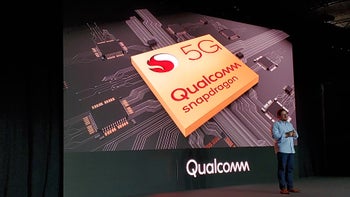Apple's inability to develop 5G smartphone modem is due to two Qualcomm patents says report

Just the other day we showed you a tweet from analyst Ming-Chi Kuo, known throughout the world as the most prescient Apple analyst around. The tweet indicated that Apple's plan to design its own 5G modem chip for the iPhone, which would be built by TSMC of course, had failed. Apple's plan to equip 80% of its 2023 handsets with an Apple 5G modem chip (leaving Qualcomm with a 20% share) had gone belly up.
Apple's forward progress in developing its own 5G smartphone modem is stymied by two Qualcomm patents
Qualcomm will now supply Apple with 100% of the 5G modems for the 2023 iPhone 15 line leaving Apple with a bad taste in its mouth. Remember, Apple paid $1 billion to buy Intel's smartphone modem business. There was speculation that after Apple reached a settlement with Qualcomm allowing all legal action between the pair to be dropped, Apple would use Qualcomm's Snapdragon 5G modem chips for a few years while developing its in-house component.


This past November, the air was full of talk that Apple would debut its own 5G modem chip that would be built by TSMC using its 4nm process node. The lower the process node number, the larger the chip's transistor count making the chip more powerful and energy-efficient. Apple has been trying to reduce its reliance on Qualcomm and Kuo said that Apple will continue to work on building its own modem chip.
According to 9to5Mac, Apple's failure to design its own 5G modem chip was not the result of Apple being unable to develop such a component. Instead, a new report indicates that the issue is related to a pair of Qualcomm patents that is blocking Apple from finishing the development of its own 5G modem. This might be related to a Supreme Court ruling announced this week in which the Court said that it would not listen to an appeal from the iPhone maker that seeks to have a pair of Qualcomm patents canceled.
Florian Mueller, writing for FossPatents (via Patently Apple), ties this all together and even goes back to the aforementioned Apple-Qualcomm settlement to explain that Apple considered Qualcomm to be the only reliable supplier of 5G smartphone modems and felt that Intel was on the wrong track. As a result, Apple agreed to the settlement in desperation knowing that it would need to obtain a continuous supply of 5G modem chips from Qualcomm until it could design its own.
A few months before the settlement with Qualcomm was announced, Apple CEO Tim Cook went on CNBC and said, "The issue that we have with Qualcomm is that they have a policy of no license, no chips. This is, in our view, illegal. And then, secondly, they have an obligation to offer their patent portfolio on a fair, reasonable, and non-discriminatory basis and they don’t do that. They charge exorbitant prices."
Apple will need to work around Qualcomm's current patents
Cook said that Apple would fight with Qualcomm to the very end. But one can almost feel the same desperation that Cook felt once it was apparent that kowtowing to Qualcomm was his best course of action. And last March the FTC refused to label Qualcomm's despised "no license, no chips" policy as being anti-competitive.
Some legal experts believe that any future legal action initiated by Apple will probably not succeed. This leaves Apple in a tough position. It could license the patents, but Qualcomm is not known as the Walmart of intellectual property. In fact, as Tim Cook noted, it is known for demanding high prices even for standard-essential patents (SEP). These are patents issued for patents that cover industry standards that are needed to build a certain product. These patents are supposed to be offered at a fair, reasonable, and non-discriminatory (FRAND) price.
Regardless of any deal it strikes with Qualcomm, Apple will no doubt continue trying to build its 5G smartphone modem around Qualcomm's patents although the crew in Cupertino is apparently stuck until that happens.













Things that are NOT allowed: